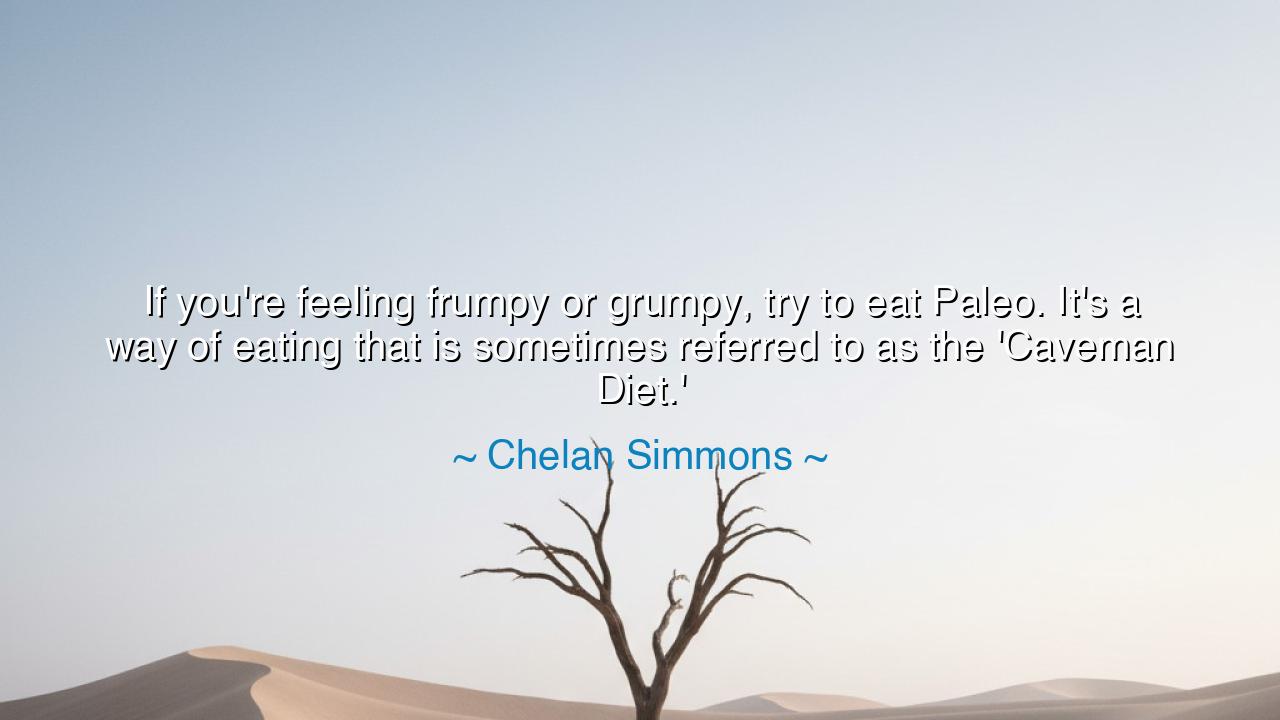
If you're feeling frumpy or grumpy, try to eat Paleo. It's a way
If you're feeling frumpy or grumpy, try to eat Paleo. It's a way of eating that is sometimes referred to as the 'Caveman Diet.'






In the words of Chelan Simmons, there is both humor and hidden wisdom: “If you’re feeling frumpy or grumpy, try to eat Paleo. It’s a way of eating that is sometimes referred to as the ‘Caveman Diet.’” Though light in tone, her words strike at a profound truth—that often, the restoration of spirit begins with the restoration of the body, and that the farther we drift from nature, the more uneasy our souls become. In this simple suggestion—eat as the caveman ate—lies an invitation to return to what is pure, elemental, and human.
The Paleo diet, as modern minds call it, is not merely a trend or a regimen of food; it is a philosophy—a return to the simplicity of the ancients. It asks us to eat as our forebears once did, before the world was dulled by refinement, before the earth’s gifts were stripped of their essence. The Caveman Diet reminds us that long before the age of machines and sugar, the human body was built on the strength of the hunt, the harvest, and the harmony between man and his environment. To eat thus is not merely to fill the stomach, but to honor the body’s natural rhythm—a rhythm that modern living has often drowned beneath noise and haste.
When Simmons speaks of feeling “frumpy or grumpy,” she is not speaking of mere vanity or fleeting mood, but of the fog that descends when one’s life-force grows dim. The body and spirit are intertwined, and when the vessel is clogged with the false and the over-processed, the light of the spirit flickers weakly. The ancients knew this truth well. The Greek physicians spoke of balance—humors kept in harmony by pure food and moderation. The sages of the East spoke of chi, the inner current of energy that flows cleanly only when the body is nourished rightly. To eat close to the earth, they said, is to live close to the divine.
Consider the story of Hippocrates, the father of medicine, who taught that “food should be thy medicine.” In his time, healing began not with potions or surgery, but with renewal of diet and spirit. When the sick came to him weary and pale, he did not fill their hands with powders or promises. Instead, he led them to the sun, to clean water, to fruit and grain still fragrant with the breath of the soil. “Eat what is real,” he would say, “and the body will remember its wisdom.” What he taught in the temples of healing is the same truth that Simmons whispers in modern jest: that health is the art of returning—returning to what the body was meant to know.
The Paleo way is not simply about meat or vegetables—it is about remembrance. It calls upon the spirit to awaken to its origins, to rediscover strength in simplicity. To eat without excess, to live without clutter, to move as the hunter moved—alert, grateful, and free. In the modern world, we have filled our tables with abundance, yet starved ourselves of vitality. We crave what is sweet and fast, and in doing so, we forget the ancient bond between food and soul. The Caveman Diet is less a diet than a mirror, showing us how far we have wandered from our roots.
But let us not mistake this return for regression. To eat like our ancestors is not to forsake progress, but to balance it—to bring modern wisdom into harmony with primal truth. The ancients adapted to survive; we must adapt to remember. When Simmons urges us to eat Paleo, she is, perhaps unknowingly, calling us to reconnect with life itself—to feel the pulse of the earth in every bite, the strength of sunlight in every fruit, and the spirit of the hunt in every meal prepared with intention.
Thus, the lesson unfolds like a song sung through the ages: heal the body to heal the spirit. When you feel weary, return to what is simple. Eat what grows, drink what flows, and move as the body was made to move. Do not let the glitter of modern excess dull your ancient light. For within you still beats the heart of the hunter, the gatherer, the child of the earth. Feed it rightly, and it will rise in strength and joy once more.
And so, remember this truth, O seeker of balance: wellness is not found in invention, but in remembrance. The path to vitality is not ahead of you—it lies behind, in the footprints of your ancestors, upon the soil they walked and the fruits they gathered. Follow them, and the fog of weariness will lift. You will find again the vigor of the old world within your modern frame, and you will see that to live well is not to have more, but to live more truly.






AAdministratorAdministrator
Welcome, honored guests. Please leave a comment, we will respond soon